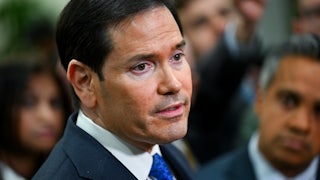You probably missed it, because it created barely a ripple in the media, but last Friday, a federal judge appointed by Donald Trump struck down one of President Biden’s most pro-worker policies: his effort to ensure that far more Americans benefit from overtime pay. Around four million salaried workers with lower incomes are the losers in this decision, yet it generated startlingly few news stories and no outraged missives from leading columnists.
Watching this all unfold brings to mind a now-forgotten controversy. Remember when Oliver Anthony, the little-known folk singer, went viral in 2023 with his song lamenting the plight of working people imposed by the “Rich Men North of Richmond”? Donald Trump and Republicans claimed the bearded, red-haired Southerner as one of their own, a veritable bard of MAGA country who’d crafted the ultimate right-wing populist ballad of protest aimed directly at supercilious elites.
“This is the anthem of the forgotten Americans,” gushed Representative Marjorie Taylor Greene. Media commentary endlessly analyzed the song as a cry of anguish straight from the blue-collar heartland, one that elite liberals should take to heart as a sign of how badly they’d failed regular Americans.
Here’s another “forgotten” detail about Anthony’s song for you to contemplate: It was about overtime pay.
“I’ve been sellin’ my soul, workin’ all day, overtime hours for bullshit pay,” Anthony croons, adding that this has led him to “drown my troubles away.” He laments that “young men are puttin’ themselves six feet in the ground,” seemingly describing oft-diagnosed social crises like self-medication, the spiritual alienation of modern work, and “deaths of despair.” All this was apparently a reference to Anthony’s own stint in a North Carolina factory, and he blames it on the “Rich Men North of Richmond”—politicians and their corporate overlords rigging the system against people like him.
This type of rigging is exactly what Biden’s overtime policy would combat. His administrative rule, proposed last year, would raise the existing income threshold for many workers to qualify for extra pay for hours beyond the 40-hour week under the Fair Labor Standards Act. Right now, that threshold is only around $35,000 per year. The rule would raise it to around $58,000.
Around four million additional people would qualify for overtime protections under this change. These are people who make more than $35,000 but less than $58,000 per year, but don’t currently qualify for overtime; to oversimplify, bosses have reclassified many of these workers as managers, exempting them from federal overtime protections.
The Biden rule would make them eligible: According to Labor Department spokesman Jesse Lawder, this group includes hundreds of thousands of people who do many types of manufacturing work as well as those holding low-to-medium-level positions in everything from retail and fast-food franchises to construction. Many are overworked and underpaid due to the same elite rigging of our economy perpetrated by the “Rich Men North of Richmond.”
Guess who managed to block this rule that would have provided those people with relief? MAGA Republicans allied with business interests, that’s who.
The lawsuit that succeeded combined two suits—one launched by Trumpy Texas Attorney General Ken Paxton, the other by a consortium of business groups. While the business coalition appears broad, it includes big players. We’re talking about the National Federation of Independent Business, which gave over $500,000 to GOP candidates (and a pittance to Democrats) last cycle; the International Franchise Association, whose board includes executives from fast-food behemoths like McDonald’s; and the National Retail Federation, whose board boasts representatives from giants like Walmart and Target. Like the “Rich Men North of Richmond,” these are well-heeled special interests who employ high-priced lawyers and lobbyists to influence politicians in D.C.
A big question now looms: Will the Trump administration fight to make this Biden rule a reality? Some critics insist that the judge, Sean Jordan, was right to strike down the rule as unlawful. But as the Biden administration argues, its means of raising the overtime threshold is in keeping with authority granted by Congress—and decades of precedent—and arguments to the contrary rely on misguided readings of the legal and practical realities at play here.* Regardless, the Justice Department can now appeal the decision. It should, to compel Trump to either keep defending it or actively let it die.
It’s unlikely Trump will continue that fight. To be fair, Trump’s record on this is mixed. In 2016, when the eligibility threshold was around $23,000, President Barack Obama tried to raise it to around $47,000, but a court struck that down. As president, Trump did raise the threshold via a similar rule (yes, presidents do have this authority), but only to a meager $35,000 (the current level), which happened to be a level that business groups could accept. Biden would expand this to millions more workers, which is why business interests tried to thwart it—apparently succeeding.
During the “Rich Men North of Richmond” controversy, certain columnists pointed a finger at liberal elites, urging deep introspection about why they have lost touch with the anxieties of people like Oliver Anthony. Now that Trump has been reelected while winning more working-class voters, including Latinos, we’re mired in another such debate.
No one should deny the need for such introspection. It’s obviously not enough for Democrats and liberals to say, “Our policies are better for people like Oliver Anthony.” A reformed approach should include an agenda that’s substantially more economically populist; a clear-eyed look at why certain liberal policies alienate working-class voters; and a deep dive into why working people are skeptical that Democrats fight for their material interests these days.
But surely it’s a sign of another profound problem, one that deeply afflicts our discourse, that a genuine effort by Democrats to lift the fortunes of millions of people struggling with low overtime pay—one blocked by a Trump judge and business elites—garnered almost zero media attention. This, even as a working-class anthem partly about that very problem captivated the media for weeks.
That disconnect captures one of the cardinal facts about our times. While Trump has broken with pro–big business orthodoxy to some degree—on tariffs and trade, for example—broadly speaking, he will outsource much of his agenda to the GOP’s plutocratic wing. He is expected to deeply slash the safety net to pay for more tax cuts for the rich, and to roll back many Biden labor policies, ones that arguably constitute the most pro-worker agenda in decades, perhaps doing nothing on overtime as well.
The media obsesses over Oliver Anthony and treats MAGA’s fetishization of him as sincere—but for all of its dutiful coverage of our policy disputes, it can’t seem to convey the larger truth about which party’s policies are actually pro-worker, and which are not.
This deception runs deep in right-wing media too. Media Matters found that Fox News devoted hours of programming to hyping “Rich Men North of Richmond,” and the network also made it the topic of the first GOP presidential debate. At my request, Media Matters searched transcripts in the SnapStream video database for Fox coverage of the ruling striking down the overtime rule—and found zero such coverage.
Yes, Anthony’s song was about more than just overtime pay. It was about a broader set of social afflictions. That helps explain all the press attention to it. But after this extended media fixation, Trump and fellow populist JD Vance faced no media pressure at all during the campaign to say where they stood on Biden’s effort to expand overtime pay to millions, or whether they’ll continue it.
That’s absurd. It reflects its own form of elite dereliction—one that leaves people less informed about the larger forces shaping their lives, the very thing, we’re told, that makes so many people like Oliver Anthony feel powerless and adrift. This elite failure too deserves some serious introspection. Perhaps someone should write a song about it.
*This piece has been updated to reflect criticisms of the administration’s overtime rule.






